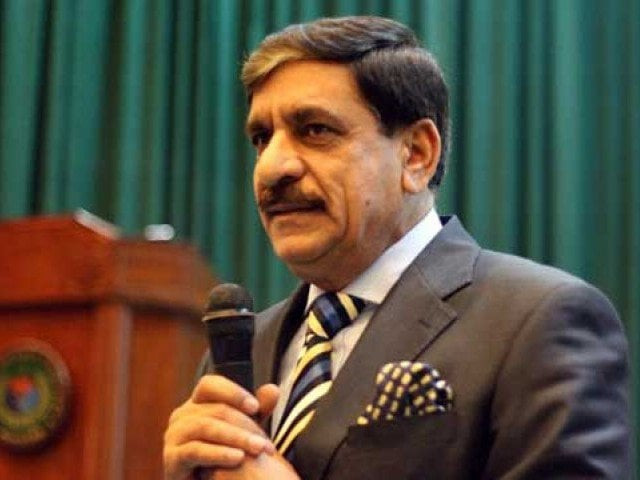Quick sharing of data: NAP panel decides to set up central record office
Also discusses proposed action against militants, Fata reforms

Lieutenant General (retd) Naseer Khan Janjua. PHOTO: DEFENCE.PK
The development took place at a meeting of the National Action Plan (NAP) Implementation Committee presided over by the PM’s National Security Adviser Lt Gen (retd) Nasser Khan Janjua.
Attorney General for Pakistan (AGP) Ashtar Asuaf, inspectors general of police (IGPs) from all provinces, officials of the Federally Administered Tribal Areas (Fata) Secretariat and other security officials showed up at the huddle.
The low key meeting discussed crucial issues including proposed action against jihadi outfits, issues involving the Centre and provinces in counterterrorism operations, Fata reforms and options to formulate effective anti-terrorism laws. Unlike the past, no press release was issued after the event.
Top leaders eye swift NAP implementation
Informed sources shared with The Express Tribune that the meet-up unanimously decided that a central record office will be established for identifying criminals in shortest possible time.
It was also decided that more personnel would be inducted and trained provincial and federal counterterrorism departments and strengthen Nacta.
The legal options to strengthen criminal prosecution, formulation of effective antiterrorism laws and necessary amendments in and restoration of the Protection of Pakistan Act (PoPA) 2014 that stood lapsed on July 15, were reviewed in the meeting, the sources said.
In September, the federal government tabled in Senate the Criminal Laws (Amendment) Act, 2016 that also contained proposed amendments in PoPA with the aim to strengthen the criminal justice system of the country under the NAP.
The government withdrew the bill after opposition parties raised the objection that PoPA stood lapsed and was not restored while the required amendments in the act needed its restoration.
The Friday meeting was of the view that until and unless concerns of the provinces as well as the problems being faced by them in the counterterrorism drive were duly brought into account, the implementation of the NAP would be marked with challenges.

The forum, the sources said, reviewed in detail the reports received from the provinces regarding relevant issues and progress on the decisions taken in the aftermath of a previous meeting of the NAP chaired by Prime Minister Nawaz Sharif on October 4.
The chief ministers of Punjab, Sindh, Khyber-Pakhtunkhwa, Balochistan and Gilgit-Baltistan were part of the October 4 meeting. In the meeting, the CMs of K-P and Sindh had reportedly shared their reservations regarding operational and financial issues being faced in the NAP’s implementation in the provinces.
K-P CM Pervaiz Khattak had demanded Frontier Corps (FC) deployment at the bordering areas that demarcate the K-P with Fata to stop unchecked movement of people due to security sensitivities.
Sindh CM Murad Ali Shah had reportedly raised the issues of fund allocation and certain operational matters concerning the security forces targeted operation in Karachi. In response, the PM had assured the provincial functionaries that their due concerns would be addressed and regular meet-ups would be held in this connection.
Reportedly, the participants of Friday’s meeting were of the opinion that the ‘unforeseen’ factors such as political pressure on the law enforcement and security agencies in discharge of their duties shall not be allowed to hinder the counterterrorism operations.
“There are 20-points that make the NAP. These points deal with administrative, legislative, financial, legal and related issues. But there are undeclared aspects as well. Political pressures – government influence and all – have to be taken care of so that ‘unforeseen circumstances’ shall not hamper our goals in counterterrorism objective,” a source quoted the NSA as having told the meeting participants.
Agencies working in line with state policy: PM’s Office
In this context, the situation in Punjab also came under discussion, prompting IG Punjab Mushtaq Sukehra to claim that the LEAs and security brass were operating freely in Punjab. He cited recent operation of the CTD in Dera Ghazi Khan, in support of his stance.
At least eight alleged terrorists were taken out in the said raid. Punjab’s top cop is also said to have referred to the targeted operations of Punjab Rangers in Faisalabad few weeks back that saw the arrests of terror suspects and high-profile criminals allegedly linked to provincial government bigwigs.
Speaking to The Express Tribune, the PM’s Adviser Amir Muqam insisted that federal government was engaged in active coordination with the provinces to address their due concerns.
“One of the key mandates of the NAP Implementation Committee is to ensure smooth coordination between the Centre and the provinces. The PM himself takes this issue very seriously and gets regular briefings on related progress. If there are any shortcomings, they will be overcome,” he said.
Published in The Express Tribune, October 15th, 2016.


















COMMENTS
Comments are moderated and generally will be posted if they are on-topic and not abusive.
For more information, please see our Comments FAQ